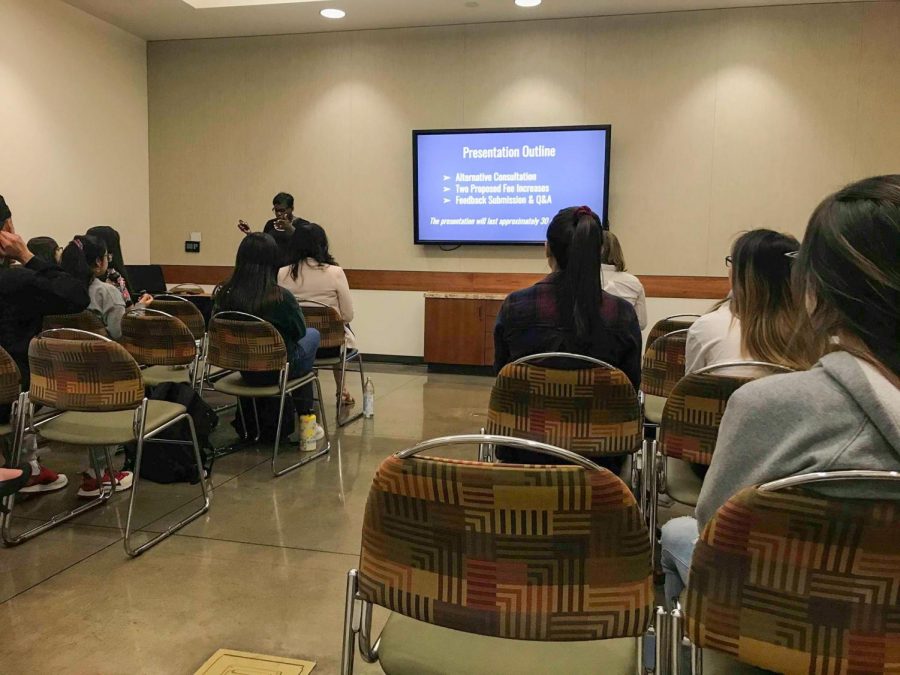Multiple organizations on campus are holding student forums to educate students regarding two proposed fee increases aimed at expanding mental health resources and funding for identity centers.
The forums, which began in October, are being held until Nov. 15. The Campus Fee Advisory Committee will then review student feedback in response to the proposed fee increases.
The increase to the Health and Wellness Fee would provide more therapists for students on campus, while the Instructionally Related Fee increase would be used on support staff for existing identity centers and help launch three proposed cultural centers on campus, including: the Asian American Pacific Islander Lounge, the Latinx Resource Center and the Native Resource Center.
The majority of student questions from past forums included clarifying questions regarding mental health services and budget questions, according to Interim Associate Vice President of Financial Operations Crystal Little. She said many students want to know why the proposed services can’t be funded without student fees.
The Health and Wellness Fee could include increases of $55, $61 or $73 per semester. The Instructionally Related Fee would be a $40 increase per semester.
The Campus Fee Advisory Committee is responsible for submitting a formal recommendation to the president’s office, believes student feedback is the most influential factor in deciding if the Health and Wellness Fee and the Instructionally Related Fee should be passed, Little said.
Faculty, staff and administrators make up CFAC members, but Little said the committee is mostly comprised of students.
Students attending a forum are required to present their Red ID to give feedback on the two proposed fee increases.
If a student cannot attend one of the scheduled forums, recorded forum information is available at the SDSU Testing Services center located in Student Services West. Students can provide feedback there after watching the video.
“We want to make this as available as possible,” Associate Vice President of Student Affairs Andrea Dooley said.
After the forums and feedback period, CFAC will meet on Nov. 22 to present their findings and share standout comments from students to the president. There will also be time allotted for public comment from students or faculty.
Then, if the fees are recommended, the president will pass the fee proposals to the chancellor for approval.
One student forum was co-hosted by the Student Health Advisory Committee and Students for Public Health on Oct. 30. Some students attending were in favor of the Health and Wellness Fee, while others were unsure about the increase in costs.
A strong supporter of the fee is SHAC chair and public health senior Mercedes Huot. She said there is a pressing need for additional mental health staff on campus.
“Being a part of college health and human services, mental health is obviously a big issue and focus for us to expand,” Huot said. “We know that the fee hasn’t increased since 2010 and we think that it’s time to set the ratio and make it better for SDSU. We definitely need more therapists and counselors on campus.”
The national standard for therapist-to-student ratios on college campuses is one therapist for every 1,500 students. However, SDSU’s ratio is about one therapist to 1,800 students, according to Director of Counseling & Psychological Services Jennifer Rikard.
The Health and Wellness Fee’s goals include reducing student wait times to see therapists, increasing counselor staffing, personalized mental health services, care navigation and a dedicated access phone line for students to speak to support staff after hours, Rikard said.
She said the fee would also help with suicide prevention, intervention and crisis management.
“Crises can’t be postponed,” Rikard said. “We have to deal with them now.”
Better mental health services would enable students to succeed and perform to the best of their abilities. The top three roadblocks for students include stress, anxiety and sleep problems, Rikard said.
Public health junior and SHAC member Nancy Vasquez said she isn’t as sure about implementing the fees due to lingering questions about how the fees will be used.
“It could be a burden on some people,” Vasquez said. “The way they answered some questions, it seemed like they didn’t really know the answer. There should be more planning on how the fees and their funds will be implemented.”
Other students asked how measures for student safety will increase with the building of the new centers and where such identity centers would be placed on campus.
The three proposed identity centers don’t have exact future locations on campus yet, Pride Center Assistant Director Anne Guanciale said.
A list of the forum dates are posted on the Budget & Finance page of the SDSU website.












